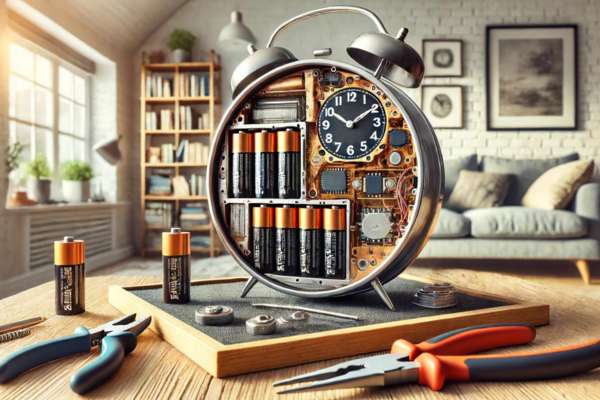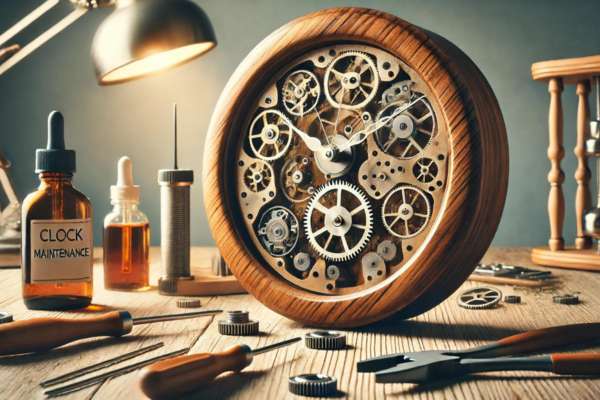Have you noticed your wall clock ticking ahead of time, leaving you puzzled and wondering, “Why is my wall clock running fast?” This common issue can disrupt your daily schedule and cause unnecessary stress. In this article, we’ll explore the various reasons why your wall clock might be running fast, from battery issues and mechanical problems to environmental factors and magnetic interference. Understanding these factors can help you identify and resolve the problem, ensuring your clock keeps accurate time. Whether you’re dealing with an old family heirloom or a modern timepiece, our insights and tips will help you get your wall clock back on track, keeping your schedule running smoothly.
Understanding Wall Clock Mechanisms

To understand why your wall clock is running fast, it’s essential to know how wall clocks function. At the heart of every wall clock is its movement mechanism, which can be either mechanical or quartz. Mechanical clocks use gears and springs to keep time, relying on precise movements and regular winding. Quartz clocks, on the other hand, use an electronic oscillator regulated by a quartz crystal to maintain accuracy. The quartz crystal vibrates at a consistent frequency, converting electrical pulses into time increments. Both types of movements require precise calibration and maintenance to function correctly. Any disruptions in these mechanisms, such as gear issues or electronic interference, can cause your wall clock to run fast.
Battery Problems

One common reason for a wall clock running fast is battery problems. Overpowered batteries can supply excessive energy, causing the clock’s mechanism to speed up. Similarly, incorrectly installed batteries can disrupt the clock’s normal function. Ensure you are using the correct type of battery recommended by the manufacturer. Avoid using high-capacity batteries not intended for clocks, as they can lead to accelerated timekeeping. Additionally, check the battery installation to confirm proper contact and positioning. Regularly replacing the batteries with the appropriate type can prevent this issue and help maintain accurate timekeeping. Addressing battery problems is a simple yet effective step to keep your wall clock running accurately.
Mechanical Issues
Mechanical issues are a common culprit when your wall clock runs fast. One primary problem is gear slippage, where the gears inside the clock shift out of alignment, causing the hands to move quicker than intended. Another frequent issue is insufficient or excessive lubrication. If the clock’s internal mechanisms aren’t adequately lubricated, friction can cause the gears to move erratically. Conversely, too much lubrication can lead to similar problems, as it might cause parts to slip and move too freely. Regular maintenance, including proper lubrication and checking gear alignment, can help prevent these issues and ensure your wall clock keeps accurate time. Keeping your clock in good mechanical condition is key to preventing it from running fast.
Environmental Factors

Environmental factors play a significant role in the accuracy of your wall clock. Temperature and humidity, in particular, can impact the internal components, causing your clock to run fast. Extreme temperatures can cause the metal parts inside the clock to expand or contract, leading to faster ticking. High humidity levels can also affect the lubrication of the clock’s gears, causing them to move more quickly than intended. To maintain accurate timekeeping, it’s essential to place your wall clock in a stable environment with consistent temperature and humidity levels. Avoid placing it near heaters, air conditioners, or windows where temperature fluctuations are common. Keeping these factors in check will help your clock run accurately.
Magnetic Interference
Magnetic interference from nearby electronic devices can cause your wall clock to run fast. Devices like speakers, televisions, and even some types of lighting emit magnetic fields that can disrupt the clock’s internal mechanism. These magnetic fields can affect the balance wheel or pendulum, causing the clock to speed up. To minimize this interference, keep your wall clock away from electronic devices and ensure it is placed in a stable, interference-free environment. If you suspect magnetic interference is the issue, try moving the clock to a different location and observe if the timekeeping improves. By addressing magnetic interference, you can help ensure your wall clock maintains accurate time.
Incorrect Calibration

One common reason for a wall clock running fast is incorrect calibration. If your clock was not properly calibrated at the factory or after a repair, it can tick faster than it should. Calibration involves setting the clock’s timing mechanism to ensure it keeps accurate time. When this process is not done correctly, the clock’s hands may move too quickly. This can happen with both new clocks and those that have been serviced. To fix this, refer to the manufacturer’s instructions or consult a professional clockmaker who can recalibrate the timing mechanism. Proper calibration ensures that your wall clock runs at the correct speed, maintaining accurate time.
Ageing Components
Aging components are a common reason why your wall clock might be running fast. Over time, the internal gears and springs can wear out, causing them to move more quickly than they should. This wear and tear can result from regular use, environmental factors, or lack of proper maintenance. As these components degrade, their ability to regulate time accurately diminishes. Regular servicing and replacing worn-out parts can help maintain the clock’s accuracy. If your clock is an antique or holds sentimental value, consider consulting a professional clockmaker to preserve its integrity while ensuring it keeps perfect time. Keeping an eye on the condition of your clock’s components can prevent it from running fast and disrupting your schedule.
Maintenance Tips

Maintaining your wall clock regularly can prevent it from running fast and ensure accurate timekeeping. Start by placing your clock in a stable environment, away from direct sunlight, extreme temperatures, and high humidity. Dust and clean your clock’s exterior and interior components gently to avoid dust buildup, which can affect its mechanism. Check and replace the batteries regularly, as weak or old batteries can cause timing issues. Additionally, ensure that the clock is level and securely mounted to prevent any movement that could disrupt its accuracy. By following these simple maintenance tips, you can keep your wall clock running smoothly and accurately, avoiding the frustration of a fast-running timepiece.
Conclusion
In conclusion, understanding “Why is my wall clock running fast?” can help you address and resolve this common issue. Factors such as battery problems, mechanical issues, environmental influences, and magnetic interference can all contribute to a fast-running clock. By following regular maintenance tips like proper placement, regular cleaning, and timely battery replacement, you can ensure your wall clock keeps accurate time. Whether your clock is a cherished antique or a modern piece, taking these steps will help maintain its reliability and precision. Remember, with a bit of care and attention, you can keep your wall clock running smoothly and avoid the frustration of constantly adjusting the time.

